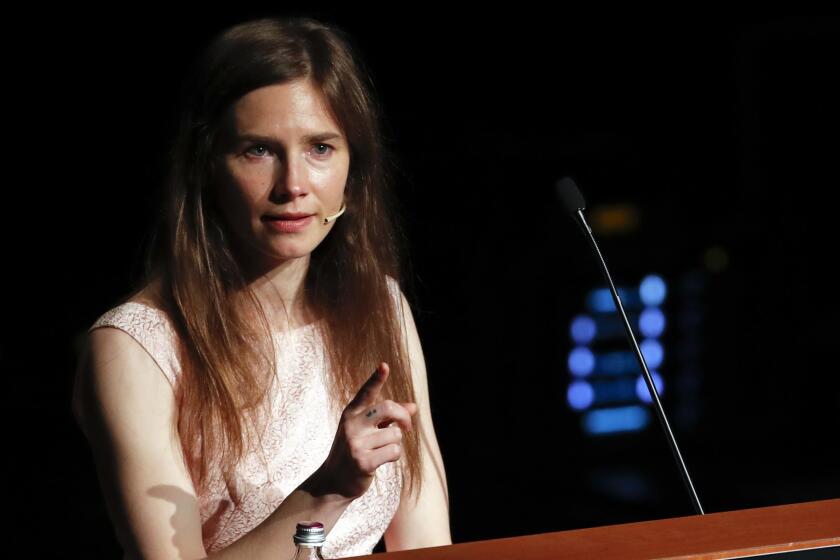Former CBS President Robert D. Wood, 61, Dies
- Share via
Robert Dennis Wood, who flew in the face of both success and conventional wisdom when he cast aside CBS’ profitable servings of corn-fed comedies and replaced them with such controversial and thoughtful programming as “All in the Family,” “MASH” and “The Mary Tyler Moore Show,” has died.
His death Tuesday night at age 61 was announced Wednesday by CBS President Tony Malara at the CBS affiliates meeting at the Century Plaza Hotel and the remainder of the session was dedicated to his memory.
Wood, president of CBS from 1969 to 1976 and most recently head of his own production company, died at St. John’s Medical Center in Santa Monica where he was admitted May 9 after suffering a massive heart attack.
Always a Broadcaster
He had been in broadcasting all his adult life, beginning in 1949 when he sold advertising for KNX, the CBS radio affiliate here. He moved to CBS television in New York in 1951 but returned four years later as general sales manager of KNXT, the network-owned Los Angeles TV affiliate. By 1966 Wood had become an executive vice president in charge of the five network-owned stations across the country and became president in 1969, a time when CBS-- because of slipping ratings--had gone through five chief executives in a like amount of years.
He inherited a commercially profitable but mundane schedule that included such rural favorites as “The Beverly Hillbillies” and “Petticoat Junction.” Rival networks ABC and NBC were turning to more imaginative fare in hopes of overtaking the industry leader. Fearing that the current CBS hits were not attracting the urban-America, youth-oriented audiences that bought advertisers’ products, Wood told Les Brown, author of “Television: the Business Behind the Box” that he opted to “bite the bullet.”
“I can either reverse back to our old ‘I’ formation,” the one-time Beverly Hills High School football player said, “or I can send out a split end. . . .”
Wood opted to pass and what he first passed on was “The Smothers Brothers Comedy Hour,” followed by “Petticoat Junction,” “The Jackie Gleason Show” and “The Red Skelton Show.”
What he partly replaced them with was a loud-mouthed bigot from Queens, N.Y., who called black people “jungle bunnies,” referred to Puerto Ricans as “spics” and summoned his Polish son-in-law by calling “Hey, Meathead.”
Not only was Archie Bunker, star of “All in the Family,” perhaps the most outrageous and frustrated “loser” in the annals of television, he began as a loser in the executive suites of CBS.
‘All in the Family’
A CBS survey of Norman Lear’s pilot film of “All in the Family” ranked it at the bottom of any prospective venture ever tested. The pilot program had been financed but rejected by ABC three years earlier and even Wood’s colleagues found it “vulgar” and “irreverent.” Despite those negatives, Wood opted to put the show on the air as a mid-season replacement and Archie and Edith Bunker quickly brought a hilarious state of reality to the heretofore bland world of situation comedy.
Wednesday, Lear remembered that the first inkling he had that CBS was interested was when Wood called him and asked if he “would still like to see the show on the air.”
It took 13 weeks for Wood’s faith to be justified by the A. C. Nielsen ratings.
Six months earlier he had taken another risk--this one based on a pilot about a bright, attractive and literate TV newswoman named Mary Richards who came to Minneapolis after a love affair had gone awry. “The Mary Tyler Moore Show” remains among the most enduring of all television memories.
In 1972 he brought “Maude” and “MASH” to the small screen, one an outspoken, irreverent liberal counterpart to Bunker’s bigotry, the second a collection of zany health-care specialists turned loose on Korea and each other during the war. Both greatly enhanced Wood’s reputation as a visionary.
To balance all this hilarity he brought “The Waltons” to the small screen but still insisted on keeping comedy the hallmark of the CBS prime-time package. In 1974-75 alone, there were nine comedy shows, including two newcomers.
Home to Southern California
While riding the crest of all this success, Wood stepped down, saying in 1976 that he wanted to go home to Southern California where “I won’t have the ducks snapping at me anymore.”
Temperamentally he might not even have been suited to the job; Lear remembered him as much more sentimental than he might have wished others to know.
“At a time when ‘All in the Family’ had first gone on the air and we were being widely condemned, a show had just screened in which Gloria (Bunker’s daughter) had a miscarriage. The show ended with Archie and Gloria in each other’s arms. Bob took the time to call and tell us how much the show had touched him. He was crying.”
Wood, who when he retired was believed to have been a network president longer than anyone in TV history, found time hanging heavy and became head of Metromedia Producers Corp., the production and distribution subsidiary of Metromedia Inc. He also formed his own company, Nephi Productions, but had been relatively inactive the past several months.
He is survived by his wife, Laura, a son, daughter and two stepdaughters. A funeral service will be held Friday at 11:30 a.m. at All Saints Episcopal Church in Beverly Hills. In lieu of flowers contributions are asked to USC where Wood was graduated in 1949. Wood served as a trustee of the university and was granted an honorary doctor of laws degree.
Contributing to this story was Times staff writer Jay Sharbutt.
More to Read
The biggest entertainment stories
Get our big stories about Hollywood, film, television, music, arts, culture and more right in your inbox as soon as they publish.
You may occasionally receive promotional content from the Los Angeles Times.










